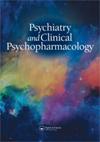Comparison of the groups treated with mirtazapine and selective serotonine reuptake inhibitors with respect to birth outcomes and severity of psychiatric disorder
IF 0.5
4区 医学
Q4 PHARMACOLOGY & PHARMACY
引用次数: 2
Abstract
ABSTRACT Objective: The literature provides very limited information on mirtazapine usage in the pregnancy period. The groups including pregnant women who used SSRI or mirtazapine as a single treatment, SSRI–mirtazapine combination treatment and unmedicated groups were compared with respect to illness severity and birth outcomes. Method: The study sample included 120 pregnant women; 40 women with SSRI usage, 16 women with mirtazapine usage, 18 women with combined SSRI- mirtazapine usage, 23 women with unmedicated psychiatric disorder and who elected not to take medication during their pregnancy or discontinued antidepressants by themselves, and 23 healthy control women. Results: No difference was obtained with regard to the gestation week of birth, birth weight, the duration of stay in the neonatal care unit among the SSRI, mirtazapine, SSRI–mirtazapine combination, unmedicated patient and control groups. The likelihood of a new diagnosis was highest in the mirtazapine group. The majority of pregnant women whose psychiatric disorders were more severe and more relapsed used SSRI–mirtazapine combination treatment. Conclusion: No difference was observed between the SSRI and mirtazapine usage in the pregnancy period with regard to the birth outcomes. Similar birth outcomes could present clinicians with the option of prescribing mirtazapine as a safe alternative to SSRI in the treatment of antenatal psychiatric patients.米氮平和选择性血清素再摄取抑制剂治疗组出生结局和精神障碍严重程度的比较
【摘要】目的:有关妊娠期米氮平使用的文献资料非常有限。将使用SSRI或米氮平作为单一治疗的孕妇组、SSRI -米氮平联合治疗的孕妇组和未使用药物的孕妇组进行疾病严重程度和分娩结果的比较。方法:研究对象为120例孕妇;40名服用SSRI类药物的女性,16名服用米氮平的女性,18名同时服用SSRI类药物-米氮平的女性,23名患有未治疗的精神障碍且在怀孕期间选择不服用药物或自行停用抗抑郁药物的女性,以及23名健康对照女性。结果:SSRI组、米氮平组、SSRI -米氮平联合用药组、未用药组和对照组在新生儿护理病房的妊娠周数、出生体重、住院时间等方面均无差异。新诊断的可能性在米氮平组最高。精神障碍较严重、复发率较高的孕妇多数采用ssri -米氮平联合治疗。结论:妊娠期使用SSRI与米氮平对分娩结局无显著差异。类似的出生结果可能会给临床医生提供米氮平作为一种安全的替代SSRI治疗产前精神病患者的选择。
本文章由计算机程序翻译,如有差异,请以英文原文为准。
求助全文
约1分钟内获得全文
求助全文
来源期刊

Psychiatry and Clinical Psychopharmacology
Medicine-Psychiatry and Mental Health
CiteScore
1.00
自引率
14.30%
发文量
0
期刊介绍:
Psychiatry and Clinical Psychopharmacology aims to reach a national and international audience and will accept submissions from authors worldwide. It gives high priority to original studies of interest to clinicians and scientists in applied and basic neurosciences and related disciplines. Psychiatry and Clinical Psychopharmacology publishes high quality research targeted to specialists, residents and scientists in psychiatry, psychology, neurology, pharmacology, molecular biology, genetics, physiology, neurochemistry, and related sciences.
 求助内容:
求助内容: 应助结果提醒方式:
应助结果提醒方式:


